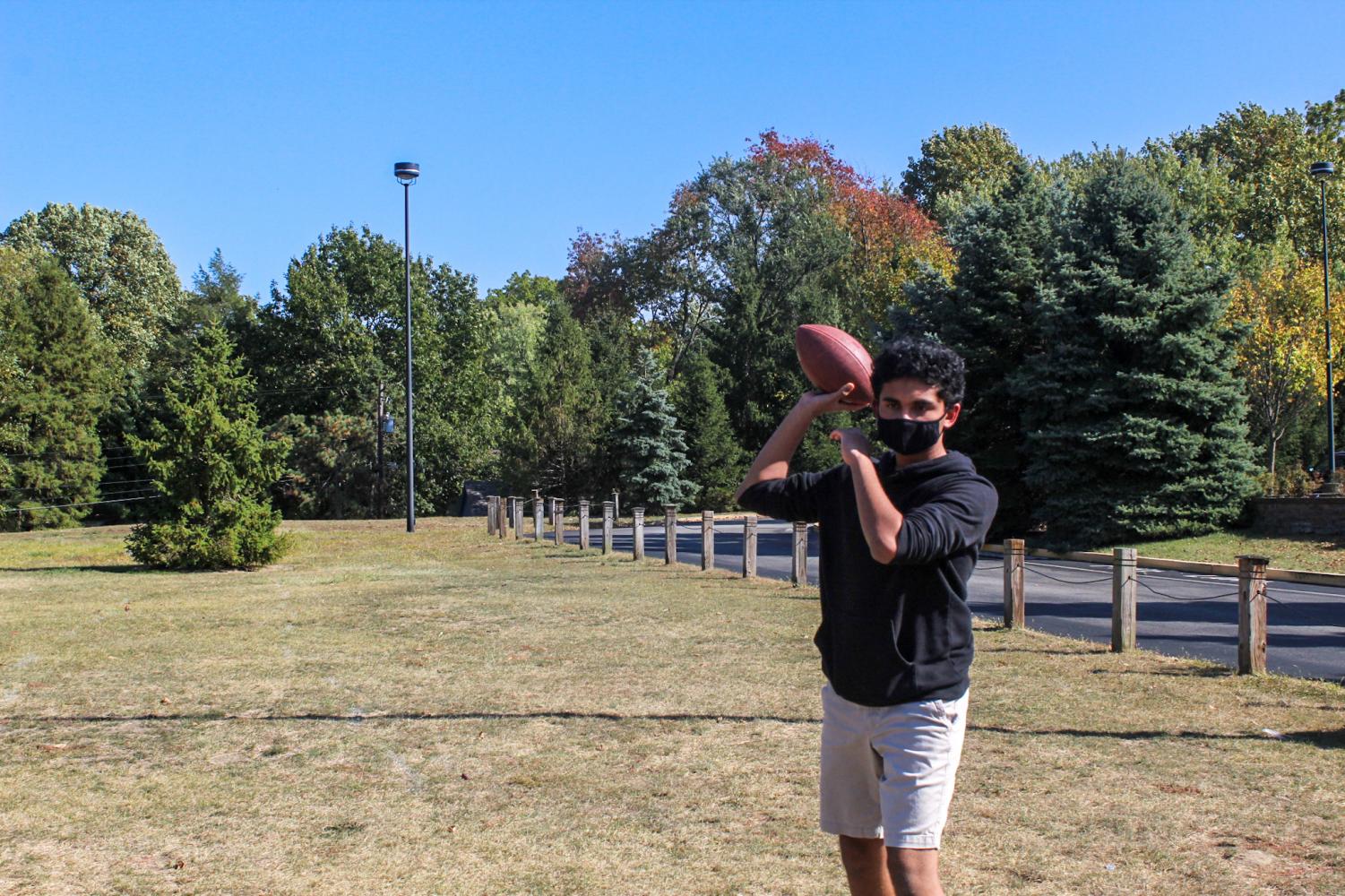The beginning of the National Football League (NFL) season also signifies the beginning of the fantasy football season for many sports fans nationwide. For many students and teachers, fantasy football is a way to become more involved with the ongoing NFL season while also doing an activity with other friends. Fantasy football, according to the NFL, is “a math-based game based on the real-life production of NFL players,” where players choose NFL players to fill out a roster. The statistics that the NFL players get during their games translate to fantasy points, and those fantasy points contribute to a points total. Players go head-to-head in this fashion, and whoever has more points wins that week’s game.
According to senior Neal Joshi, fantasy football motivated him to watch and pay attention to games that he typically would not care about. “I’m a Colts fan, so I’d usually watch the Colts games. But with fantasy football, I have begun paying attention to other games that I normally would not watch, because there might be someone playing who is on my roster” said Joshi. Additionally, for some players, fantasy football has made them feel much more involved with football. According to science teacher James Hambley, he felt much more ownership over the results of the team and he felt more invested in the outcome of games due to fantasy football.
“Before fantasy football, I was a fan, but I didn’t feel much ownership over the success and failures of the team,” Hambley said. “After fantasy football, because I’m the one deciding on which players to trade and which players go out there and which players are valuable, I feel a little bit more ownership of it, and, because of my competitive nature, I would say that that makes me more invested in the outcomes.”
For others, fantasy football reinforced existing ways of viewing the game. Freshman Shravan Chengalva, said that he often watched games for the individual performances of players before starting fantasy football, and fantasy actually increased that tendency.
“Before fantasy football, I always tracked certain players on certain teams, just wanting them to do good,” Chengalva said. “But fantasy football has taken it to another extreme. I watch games on Sunday regularly, so whenever I turn on the TV and I’m watching the game, I’m always like ‘Ok, I want this one player to do good and I want this one player to do not so good just for this one week.’”

Chengalva acknowledged that such an approach to watching football can have its drawbacks.
“It takes away the whole team aspect of the sport,” Chengalva said. He cited the Monday Night Football game between the Kansas City Chiefs and the Baltimore Ravens on Sept. 28. “My whole focus was not on the game itself, because this other guy I was facing had (Chiefs quarterback) Patrick Mahomes, so I was ‘No, no, no, I don’t want (Mahomes) to do good,’ so all of my focus went to that instead of the actual game.”
There also exists a social aspect to fantasy football. Both Chengalva and Joshi said they first started playing fantasy football because they saw other friends playing it and wished to join. Additionally, Chengalva and Hambley said fantasy football helped them connect with other friends that they usually could not talk to.
“Some of my friends who I had gone to school with, who I had not been able to see much anymore after we ended up at different colleges, started playing, so it was a way for me to connect with them,” said Hambley, adding, “it gives you a reason to interact with people that you might not have much other reason to interact with.”
Ultimately, Hambley sees fantasy football as a fun activity that also lets him connect with other friends. “It’s definitely a good way to keep up with friends that you wouldn’t otherwise keep up with, and it’s also an entertaining and fun way to spend time if you’re someone who’s fairly competitive and enjoys games that you can play with other friends that are competitive.”


































![AI in films like "The Brutalist" is convenient, but shouldn’t take priority [opinion]](https://hilite.org/wp-content/uploads/2025/02/catherine-cover-1200x471.jpg)










































![Review: “The Immortal Soul Salvage Yard:” A criminally underrated poetry collection [MUSE]](https://hilite.org/wp-content/uploads/2025/03/71cju6TvqmL._AC_UF10001000_QL80_.jpg)
![Review: "Dog Man" is Unapologetically Chaotic [MUSE]](https://hilite.org/wp-content/uploads/2025/03/dogman-1200x700.jpg)
![Review: "Ne Zha 2": The WeChat family reunion I didn’t know I needed [MUSE]](https://hilite.org/wp-content/uploads/2025/03/unnamed-4.png)
![Review in Print: Maripaz Villar brings a delightfully unique style to the world of WEBTOON [MUSE]](https://hilite.org/wp-content/uploads/2023/12/maripazcover-1200x960.jpg)
![Review: “The Sword of Kaigen” is a masterpiece [MUSE]](https://hilite.org/wp-content/uploads/2023/11/Screenshot-2023-11-26-201051.png)
![Review: Gateron Oil Kings, great linear switches, okay price [MUSE]](https://hilite.org/wp-content/uploads/2023/11/Screenshot-2023-11-26-200553.png)
![Review: “A Haunting in Venice” is a significant improvement from other Agatha Christie adaptations [MUSE]](https://hilite.org/wp-content/uploads/2023/11/e7ee2938a6d422669771bce6d8088521.jpg)
![Review: A Thanksgiving story from elementary school, still just as interesting [MUSE]](https://hilite.org/wp-content/uploads/2023/11/Screenshot-2023-11-26-195514-987x1200.png)
![Review: "When I Fly Towards You", cute, uplifting youth drama [MUSE]](https://hilite.org/wp-content/uploads/2023/09/When-I-Fly-Towards-You-Chinese-drama.png)
![Postcards from Muse: Hawaii Travel Diary [MUSE]](https://hilite.org/wp-content/uploads/2023/09/My-project-1-1200x1200.jpg)
![Review: "Ladybug & Cat Noir: The Movie," departure from original show [MUSE]](https://hilite.org/wp-content/uploads/2023/09/Ladybug__Cat_Noir_-_The_Movie_poster.jpg)
![Review in Print: "Hidden Love" is the cute, uplifting drama everyone needs [MUSE]](https://hilite.org/wp-content/uploads/2023/09/hiddenlovecover-e1693597208225-1030x1200.png)
![Review in Print: "Heartstopper" is the heartwarming queer romance we all need [MUSE]](https://hilite.org/wp-content/uploads/2023/08/museheartstoppercover-1200x654.png)




